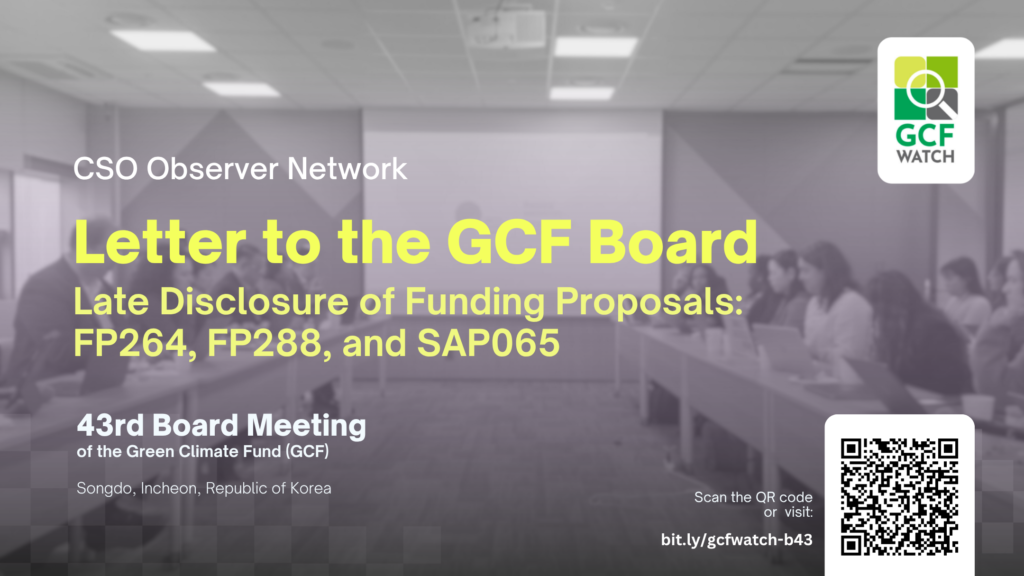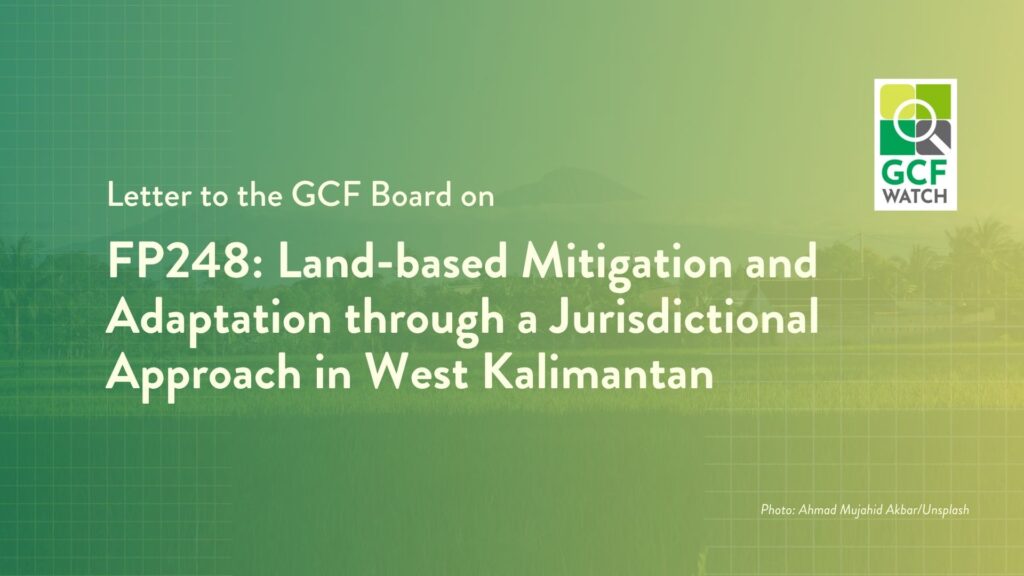Letter to the GCF Board on FP264: Prosperete Growth Fund
Dear Board members, alternates, and advisors,
We have serious concerns about the proposed programme FP264 and call for the Board not to approve this proposal.
This proposal in many ways operationalizes the worst fears we voiced during the adoption of the PSAA, whose stated purpose of enhancing direct access by giving non-accredited entities an opportunity to submit one funding proposal has been corrupted by championing a special purpose vehicle designed primarily for the access to GCF funds.
Providing US$50 million in equity financing to an entity that has no track record of investments, no track record of closing a fund, no track record of actually using the governance mechanisms and safeguarding policies that it has recently put in place, and no audit trail or past reporting is a fundamental risk, and not the type of risk the GCF should be taking. It is not a risk that will drive any sort of innovation, but one that if materialised, has the potential to negatively affect communities in the target countries. In particular, the risk that ESS standards cannot be upheld by an institution without experience-tested processes in place, given its very newness, is significant.
Approving this proposal poses considerable risks to the GCF as an investor. The entity behind the proposal, Prosperete Investment Management Ltd., was only registered as a company on 24 October 2024. While the proposal repeatedly refers to work that Prosperete has done, this is misleading since the organization has not undertaken such work. As noted in the Secretariat assessment, the PSAA assessment is largely based on the “the two founders’ and team’s personal track record in similar funds and projects”, as described in a third-party report that Prosperete itself provided. This implies a level of trust bordering on credulity that has never been extended to other GCF accredited entities.
It is far from clear to us that GCF rules have been properly followed in assessing this proposal. As noted in the Secretariat assessment, “The accreditation process for PIML began with the submission of the first set of materials on 13 June 2024”, with the first review “completed in July 2024.” This first review was completed three months prior to the incorporation of PIML as a business, yet the very first question of the initial completeness check at the start of any accreditation is documentation confirming the legal status of the entity. “Legal status” and “track record” are also a part of the initial questionnaire for the PSAA. We are baffled as to how this accreditation was allowed to proceed in July 2024 in advance of PIML having been granted legal status.
The proposal also raises a significant Conflict of Interest concern. As noted in the responses to technical questions, Prosperete is heavily reliant on the experience of its founders while they were working for the IFC. As this is a background that the founders share with some GCF Secretariat staff, and it is not clear who has oversight of the PSAA or what firewalls were operationalized in that process, it would be important to have greater transparency to rule out any actual, apparent or perceived Conflict of Interest.
Prosperete is being judged by a substantially different, lower standard to other entities the GCF works with, which was not the purpose of the PSAA and thus risks undermining the accreditation process, even under the anticipated revised accreditation framework. Smaller direct access entities are routinely asked for considerable documentation of their organizational track record (e.g. three years of audited financial statements) just to handle small and micro-scale projects, which are far simpler to execute than the proposed medium-scale equity investment. Prosperete, by contrast, has provided no audited financial statements because none exist. This is a complete perversion of the fit-for-purpose principle of accreditation, where greater scrutiny should be applied to entities asking for more money to conduct riskier activities. The inverse seems to apply here.
Additionally, the potential scope is not aligned with the no-objection letters provided, or the country cases that the proposal relies on and assumes.This misalignment speaks to a lack of country ownership, and potentially contributes to over-inflated claims of anticipated impact, noting we have consistently seen claims of impact for equity projects exceed the reality they are able to achieve post-approval.
In short, we strongly urge that FP264 is not approved by the Board given the risks posed by offering US$50 million in equity funding to an organization that has no track record and was not even in existence when the Board last met in October 2024. Furthermore, this proposal raises significant questions about the purpose and integrity of the PSAA approach: the PSAA should not just be a short-cut for the private sector to bypass the standards to which other entities are held.
Yours,
The GCF observer network of civil society, Indigenous Peoples, and local communities
DOWNLOAD PDF COPY
***
EDITOR’S NOTE: The observer network circulated this letter to Board members, alternates, and their advisors prior to the 41st Board Meeting of the Green Climate Fund (B.41). An intervention is also set to be delivered during the consideration of Funding Proposals at B.41.








